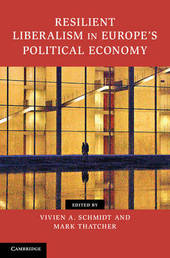
|
Resilient Liberalism in Europe's Political Economy
Hardback
Main Details
| Title |
Resilient Liberalism in Europe's Political Economy
|
| Authors and Contributors |
Edited by Vivien A. Schmidt
|
|
Edited by Mark Thatcher
|
| Series | Contemporary European Politics |
|---|
| Physical Properties |
| Format:Hardback | | Pages:469 | | Dimensions(mm): Height 234,Width 157 |
|
| Category/Genre | Political economy |
|---|
| ISBN/Barcode |
9781107041530
|
| Classifications | Dewey:330.94 |
|---|
| Audience | | Professional & Vocational | |
|---|
| Illustrations |
5 Tables, black and white; 6 Line drawings, black and white
|
|
Publishing Details |
| Publisher |
Cambridge University Press
|
| Imprint |
Cambridge University Press
|
| Publication Date |
29 August 2013 |
| Publication Country |
United Kingdom
|
Description
Why have neo-liberal economic ideas been so resilient since the 1980s, despite major intellectual challenges, crippling financial and political crises, and failure to deliver on their promises? Why do they repeatedly return, not only to survive but to thrive? This groundbreaking book proposes five lines of analysis to explain the dynamics of both continuity and change in neo-liberal ideas: the flexibility of neo-liberalism's core principles; the gaps between neo-liberal rhetoric and reality; the strength of neo-liberal discourse in debates; the power of interests in the strategic use of ideas; and the force of institutions in the embedding of neo-liberal ideas. The book's highly distinguished group of authors shows how these possible explanations apply across the most important domains - fiscal policy, the role of the state, welfare and labour markets, regulation of competition and financial markets, management of the Euro, and corporate governance - in the European Union and across European countries.
Author Biography
Vivien A. Schmidt is Jean Monnet Professor of European Integration and Professor of International Relations and Political Science at Boston University and Founding Director of Boston University's Center for the Study of Europe. Mark Thatcher is Professor in Comparative and International Politics in the Department of Government at the London School of Economics and Political Science.
Reviews'Given the abject failure of neo-liberalism's latest policy offering - austerity - to promote growth in Europe, why are neo-liberal ideas and policies still the only game in town? The answer to such a simple question involves multiple threads of explanation, linking powerful interests to ideational plasticity, and institutional stickiness. Schmidt, Thatcher, and their collaborators have delivered a volume that gives us powerful answers to these pressing questions.' Mark Blyth, author of Austerity: The History of a Dangerous Idea 'Neo-liberalism persists, paradoxically, as a dominant approach to European policymaking despite mountains of evidence showing that it fails to deliver on its promises. In Resilient Liberalism in Europe's Political Economy an outstanding team of social scientists explains this paradox by showing how neo-liberalism's malleability, partial implementation, discursive and institutional advantages and powerful supporters have frustrated most efforts to sweep it aside. In doing so they provide lessons about how we might defend against neo-liberalism in the future ...' John L. Campbell, Class of 1925 Professor, Dartmouth College, and Professor of Political Economy, Copenhagen Business School 'The neo-liberal trust in efficient markets has failed dramatically in the present crises, but the paradigm still seems to shape economic and social policies in Europe. The contributors to this volume have documented the resilience of neo-liberal beliefs and practices in a range of crucial policy fields and they succeed in explaining specific policy trajectories within a common frame of reference. Intellectually exciting and immensely enlightening.' Fritz W. Scharpf, Director Emeritus, Max Planck Institute for the Study of Societies, Cologne 'The major contribution made by this volume, then, is not the rigid definition of an ideology, but the identification of particular traits of Anglophone capitalism that have spread under a particular moniker ... any scholar working in analysis of modern political economy would do well to study this volume. It contains many insights that are cogent with topical debates.' Greg Barnes, Journal of Common Market Studies
|